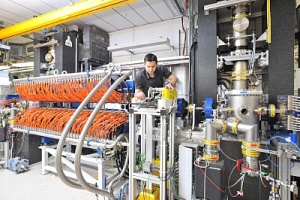Aug 12 2013
The chair for RF engineering at Technische Universität Dresden (TU Dresden) and the Helmholtz-Zentrum Dresden-Rossendorf (HZDR) recently embarked on a new joint effort with the goal of developing improved diagnostic tools for use in accelerators. Using a novel compact miniature spectrometer, the researchers are planning on measuring terahertz waves at ELBE, the HZDR’s electron accelerator.
 Michael Kuntzsch working at the new ELBE terahertz source of the HZDR. Photo: HZDR/Frank Bierstedt
Michael Kuntzsch working at the new ELBE terahertz source of the HZDR. Photo: HZDR/Frank Bierstedt
Thanks to the realization in standard semiconductor processes, the new measuring instrument will occupy an area of just a few millimeters in diameter and thus be several orders of magnitude smaller, less expensive, and more user-friendly than existing solutions.
The technical expertise contributed by the TU Dresden engineering team headed by Prof. Dirk Plettemeier and Dr. Niels Neumann in the area of RF systems and microwave technology meets HZDR competency in the area of accelerator physics and terahertz technology. As its wavelengths are much longer than in the visible range, terahertz radiation is invisible and is located between distant infrared and microwaves within the electromagnetic spectrum. The HZDR operates two free-electron lasers in the terahertz range plus a super-radiant terahertz source that is currently under development. One of the project’s coordinators, HZDR physicist Dr. Michael Gensch, is the man in charge of this new radiation source.
To date, funds totaling 400,000 euros are allocated to the Dresden-based project InSEl (which stands for “integrated spectrometer for electron bunch form online diagnosis”). The project is funded by the German Federal Ministry for Education and Research (BMBF), whose “network funding measures” aim at strengthening collaboration and networking among providers of large-scale equipment and the universities.
The HZDR and the TU Dresden are both members of the DRESDEN-concept network whose goal is to achieve greater visibility for Dresden as a center of excellence in research as well as supporting collaboration between the different participating institutions.